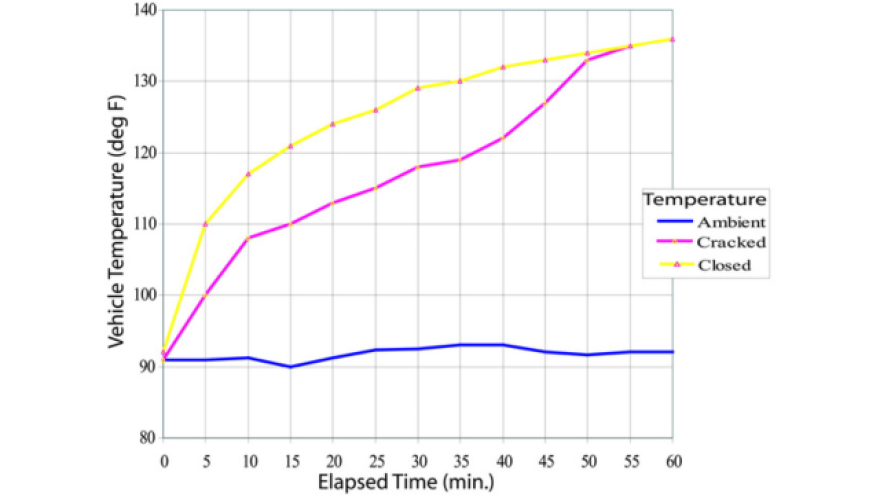BETHLEHEM, Pa. — Cracked window or not, the inside of a car can heat up impressively fast amid high temperatures.
Despite officials advocating against leaving children or pets in a locked car in the summer heat, it can still happen — enough that it's caused 972 deaths in children since 1998.
The National Highway Traffic Safety Administration says heatstroke “is one of the leading causes of non-crash fatalities among children.”
Just last year, 29 children died of heat stroke in vehicles. From 1998 to 2023, NoHeatStroke.org — resource cited by the NHTSA and the National Child Passenger Safety Board — reports that Pennsylvania saw 14 pediatric vehicular heatstroke deaths.
"A child's body temperature rises three to five times faster than an adult's."National Highway Traffic Safety Administration
And, while it may seem like a few minutes away from the car, the NHTSA says “a child's body temperature rises three to five times faster than an adult's,” with temperatures upward of 107 degrees proving fatal in children.
Even in moderate spring and summer weather, vehicles can heat up to fatal temperatures, according to the National Weather Service. It only takes 25 minutes for a car to reach 100 degrees internally in 73 degree weather.
When the ambient temperature — actual outdoor temperature — is 93 degrees, it takes just 10 minutes to exceed 100 degrees internally. Within an hour, the vehicle can skyrocket to more than 130 degrees inside.
With cracked windows, the scenario isn't much better. At around 90 degrees, the internal temperature of a car with a cracked window still peaks at roughly 135 degrees just under an hour.
The NWS cited a 2005 study from Catherine McLaren, which found that “leaving windows cracked does not significantly slow the heating process or decrease the maximum temperature measured inside the vehicle.”

“To prevent serious heat related illness or death, children should never be left unattended in a vehicle,” the NWS webpage said.
Still, what should you do if you spot a child locked in a car in such high temperatures?
The NHTSA recommends calling 9-1-1 immediately.
That approach changes when it comes to pets inside vehicles.
The Humane Society of the United States recommends taking the following steps if you see a pet locked inside a vehicle:
- Write down the car's make, model and license plate number.
- Notify management or security of nearby businesses and ask them to make an announcement to find the car's owner.
- If the owner can't be located, call the non-emergency number of local police or animal control and wait until they arrive.
In Pennsylvania, the Animals in Distress Law (Act 104 of 2018) allows public safety professionals, like law enforcement officers, humane society police officers, emergency responders or animal control officers to remove a pet from a vehicle if the owner cannot be located, without liability.
The bill, often known as the “Hot Car Bill,” does not give civilians the authority to take such action. Only Arizona, California, Colorado, Connecticut, Florida, Indiana, Kansas, Louisiana, Massachusetts, Ohio, Oregon, Tennessee, Vermont, and Wisconsin have “good Samaritan” laws that protect citizens, according to the Michigan State University Animal Legal & Historical Center, which the National Humane Education Society cites.
The Humane Society of the United States also suggests civilians:
- Get informed about state and local laws about leaving pets in hot cars.
- Be ready to call for help with essential phone numbers on hand.
- Spread the word.
- Ask local businesses to post signs asking customers to not leave their pets in cars while shopping or dining to raise awareness.
- Speak up if your town or state doesn't have a law prohibiting such actions, like attending local meetings.
According to People for the Ethical Treatment of Animals (PETA), by early June, 14 dogs and other companion animals reportedly died from heat-related causes. There have also been 24 rescues this year.
In 2023, there were 163 heat-related pet deaths and 855 rescues.
Mostreport notes say the pet died “after they were left in a hot car,” or “after being left in a car without air conditioning for an extended period.”
PETA also recommends educating the owners on heat-related illness in pets and the dangers of leaving them in locked cars if they appear. The organization also suggests civilians “do what's necessary to save the animal's life.”
Although, law enforcement advises against it.
"Animals are property, so you could be subject to a charge of theft or even attempted theft. If you are gaining access by breaking a window, well then you're looking at criminal mischief charges."Michael Spada, Pennsylvania State Police Animal Cruelty Officer
Pennsylvania State Police Animal Cruelty Officer Michael Spada said members of the public who would either open an unlocked vehicle or break a window to reach a distressed animal could “absolutely” face charges. And, sometimes, action might be unnecessary depending on the vehicle.
Spada added that some electric vehicles, like Teslas have a “dog mode” or an interior air-conditioning mode that would control the climate of a locked vehicle, so it's important to monitor the animal before taking action and to check what type of car the animal is inside, if possible.
“First of all, you're entering someone else's car and you're removing an animal,” Spada said. “And animals are property, so you could be subject to a charge of theft or even attempted theft. If you are gaining access by breaking a window, well then you're looking at criminal mischief charges.”
Instead, Spada suggests being resourceful of nearby local businesses.
“You might have store security, you might have mall security, you might have park security,” Spada said.
Those individuals are protected within reason by the state's “Hot Car Bill.”
As for the pet owners, depending on the pet's condition, Spada said they too could face charges.
“If the animal is okay, it would be up to the law enforcement officer that would be investigating this,” he said. " … If there's a weather-related injury, you could face a charge, whether it's a neglect charge or a cruelty charge.”


